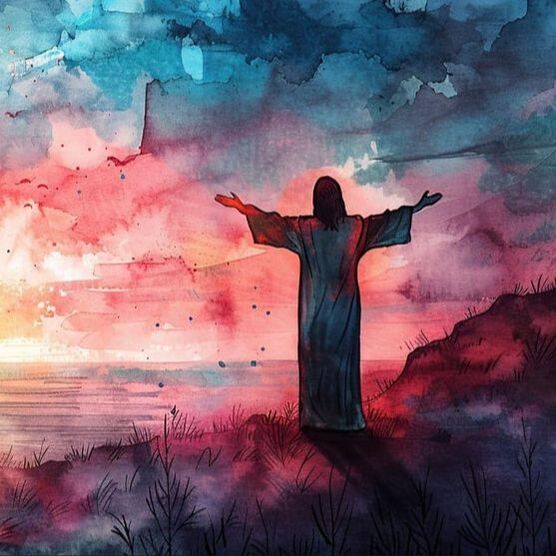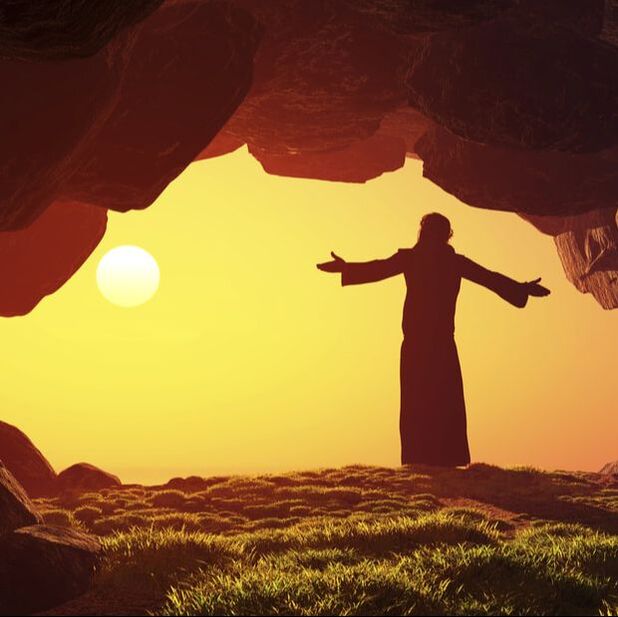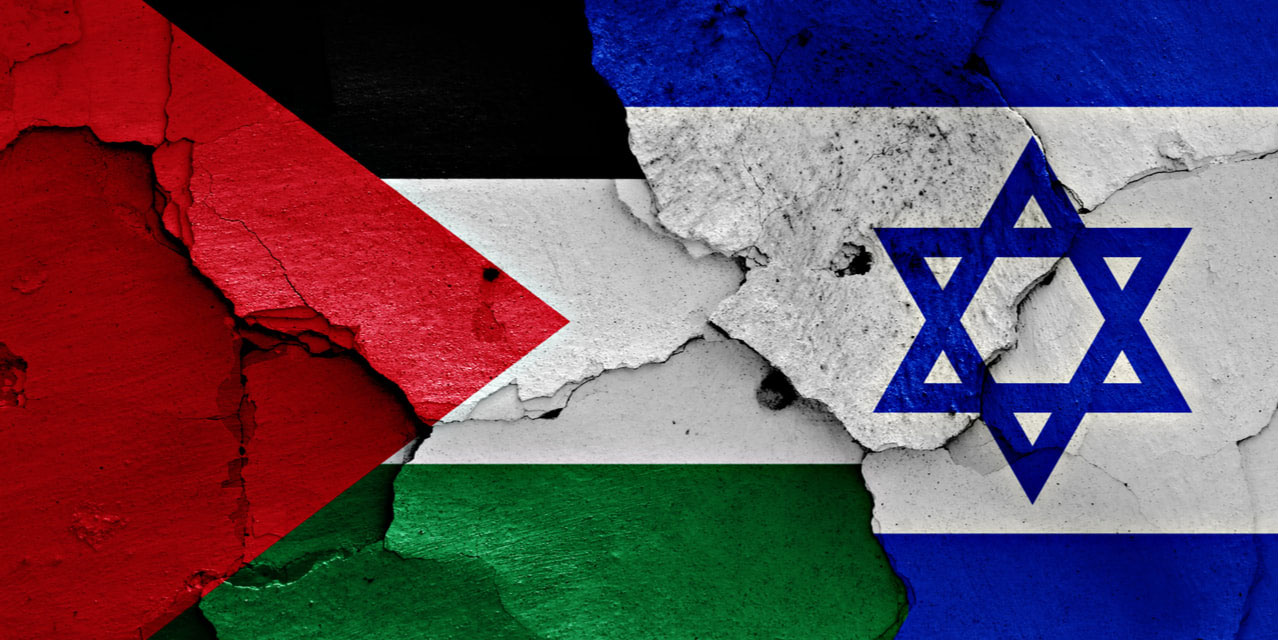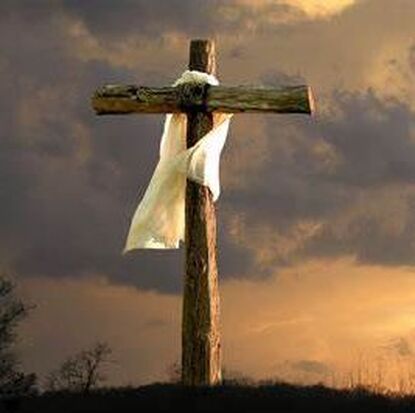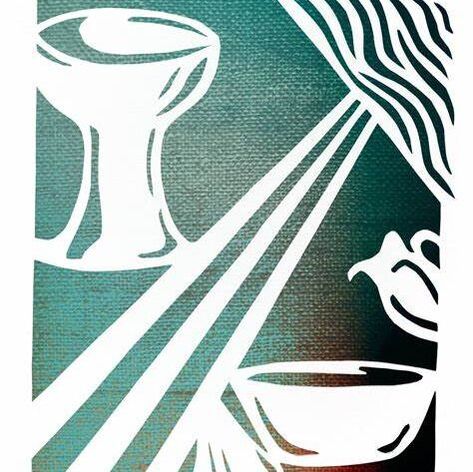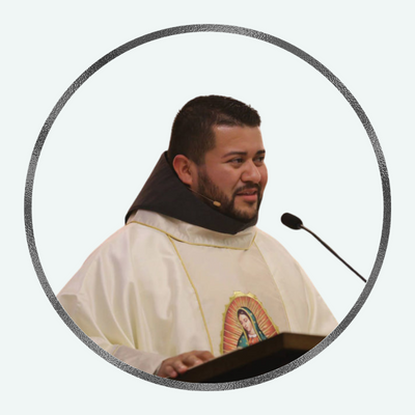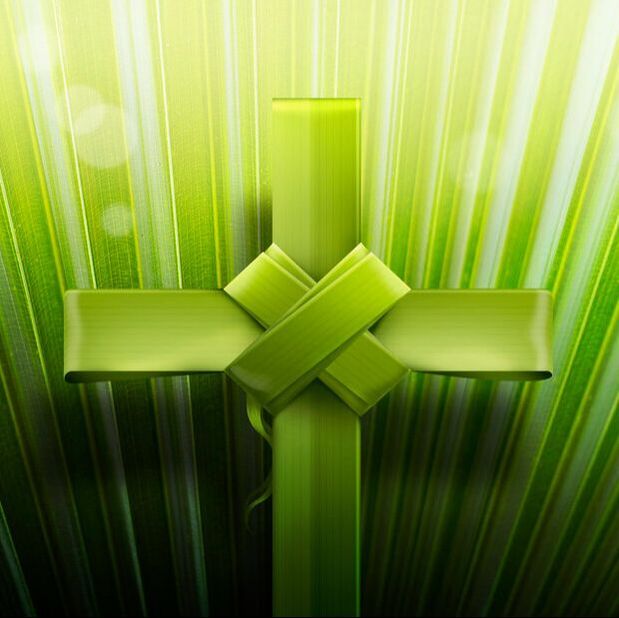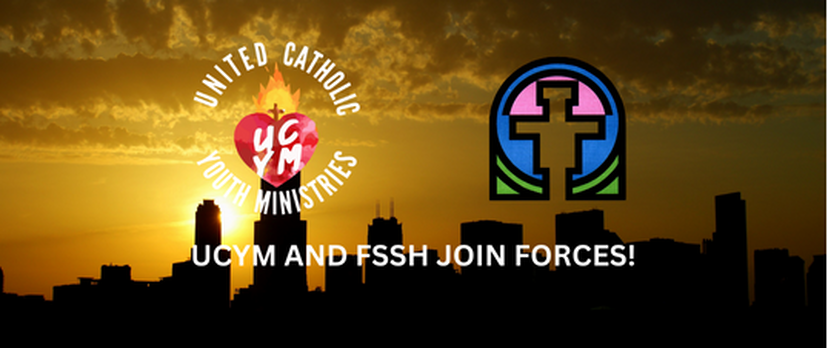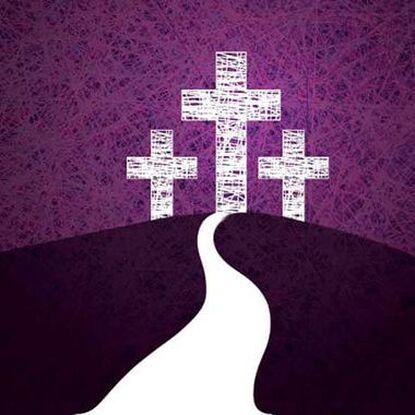|
Easter Sunday Reflection Elizabeth Becerra Director, Leadership Academy The Resurrection of the Lord - Christ is Alive, Alleluia, Alleluia! One Sunday morning, thirteen Easters ago, a younger version of me sat in a pew. I attended Mass alone. I strategically sat in the middle of the pew so as not to be bothered by others. My heart was heavy. My soul longed for a love that only One can fill. So many wrong turns, bad choices, selfish acts, and lies had left me feeling empty, worthless, and hopeless. I reluctantly sat, waiting for Mass to begin with the promise that, somehow, the Eucharist would heal my deep wounds. The Mass cleansed my soul. From the moment the processional hymn began, I started to sob. Tears rolled down my face as I thought about all of the bad choices I had made. I asked for forgiveness and placed my life in God's hands, saying, "I have messed up my life in every way possible. I cannot live like this anymore. I surrender my life to you. Lead me." Suddenly, with that thought, I felt alive again! I echo Pope Francis' words, "Christ is alive, and he wants you to be alive!" (Christus Vivit, §1) Mary of Magdala, Simon Peter, and the other disciples visit Jesus' tomb to find only his burial clothes. Jesus did not remain on the cross nor in the tomb. Jesus is alive! Jesus lives in you! We, too, should not stay on the cross of our sins. We should choose life, a life led by God in service of others. "No one has greater love than this, to lay down one's life for one's friends (JN 15:13)." Jesus laid down his life so that we may live. How are you living? How do you bring life to others? How do you celebrate the mystery of Easter every day?" Easter Sunday Reflection
Ed Villaseñor Board of Directors, Faith Formation and Evangelization Team Joy & Happiness. These are such simple emotions, yet on this Resurrection Sunday, joy and happiness take on their most profound meaning, because our friend Jesus is alive and well. Genesis tells us that God created human beings in Their likeness and image. It continues with “the Lord God says it is not good for man to be alone”. Being in a relationship with God is at the core of our existence, and Resurrection Sunday is when the emotion of that relationship is most deeply felt. As we journeyed with Jesus through his Passion, we experienced a sense of sadness and grief. We internalize the loss and carry it through Good Friday and Holy Saturday. I recently realized that during this time, I don’t pray. I mean, really pray in a quiet contemplative way. At first, I thought it was because I was so busy preparing the physical church space and practicing music, etc. But then I realized that my hyperactivity was covering up the loss I was feeling. A loss of a relationship, not just missing a friend that was temporarily away, but a profound feeling of loss. I didn’t feel my friend was there and I was suffering a true emptiness in our relationship. My feelings were selfishly directed inward. However, on Resurrection Sunday, my feelings move outward, I want Jesus to know how much I missed Him. I get a real sense of reconnection. My friend has returned. I can only imagine the feelings of joy and happiness the disciples in the upper room must have felt. After they processed the shock of seeing their friend Jesus return from the dead, their joy must have been overwhelming. Resurrection Sunday gives all of us the chance to express to Jesus how happy we are to see him. It is not good to be alone, and showing Jesus how important He is to us, on a visceral level, gives true meaning to our relationship. The feelings of joy and happiness on Resurrection Sunday are made palpable by suffering through the contrasting emotion of the previous days of the Triduum. On Easter, our feelings of joy and happiness bubble out of us, because the personal relationship that felt lost is restored. Our friend Jesus is alive and well. Easter Vigil Reflection
Cynthia Judge Board of Directors, Co-Chair for Communications and Outreach Storytelling is an art, helping us understand ourselves and each other. The Easter Vigil, the culmination of the Triduum, is the ultimate in Storytelling. At the Easter Vigil, we hear nine Stories with important words in each that lead us from darkness to our Risen Christ. The First Story thrillingly describes Creation: When God created the heavens and the earth, The earth was a formless void And darkness covered the face of the deep While the Spirit of God swept over the face of the waters, Then God said, “Let there be light” How often have we felt that darkness has covered us, and we’re living in a formless void. God, the great Creator knew then and knows now how tremendously powerful God’s Light is. Our second Story offers Abraham as a model to us when he says, Here I am. How important for each of us to say to God we are here, ready to do God’s will. Moses is the hero of the third Story, leading God’s people to believe in the Lord as they were saved. Let us believe. The fourth and fifth Story read like poetry as God tells us My love will never leave you and Listen, so that you may live. Comforting words, knowing God is right beside us, right inside us. The sixth Story offers these words: where there is wisdom… there is light and peace. Look for the light. The seventh Story offers these gifts: A new heart I will give you and a new Spirit I will put within you. Receive these gifts. Our eighth Story urges us: Know that Christ, being raised from the dead, Will never die again…..So you must consider yourself dead to sin, once for all, And alive to God in Christ Jesus. Our Lenten Journey leads us here, to this new life in Christ. The final Story is the Gospel of Mark, and we learn along with the women who went to the tomb that Jesus has been raised. Alleluia!! Nine powerful Stories. I encourage you to read these Stories, find what words bring you Light and then, live like you truly have the Risen Christ in you and spread your Light to the world. Oblate James Holzhauer-Chuckas, ObSB Joins Interfaith Leaders in Statement Denouncing Antisemitism and Islomophobia.On behalf our team and the Board of Directors at UCYM, I am calling for a ceasefire in Gaza, along with the release of all hostages and an overall increase in humanitarian aid. I join my fellow religious leaders in Evanston who have authored the following statement for our local community in Evanston and we extend these thoughts, as an organization that serves in many places. As we reflect this Good Friday on the Passion and Death of Jesus, let us do what is possible for us to combat violence and all that which leads to violence in word and action. Yours in the Divine, EVANSTON INTERFAITH CLERGY AND LEADERS RESPOND TO THE CRISIS IN ISRAEL/GAZA AND ANTISEMITISM AND ISLAMOPHOBIA IN OUR COMMUNITY
We refuse to harden our hearts to the suffering of Israelis or Palestinians. And we raise our voices loud and clear against the indiscriminate harming of all civilians, both in Gaza and Israel. This conflict deeply impacts our Evanston community where antisemitism and Islamophobia are being emboldened and are explicitly targeting members of our community. Only through recognizing that our lives are shared with one another in an interdependent web can we begin to co-create the world for which we so desperately long. We are horrified by Hamas’s crimes against innocent civilians on October 7, including murder, rape, mutilation, and the taking of hostages. Tens of thousands of Israelis have been displaced from their homes near the Gaza border, and more than a hundred people are still being held captive in Gaza. We are also horrified by Israel’s ongoing assault on Gaza in which tens of thousands of Palestinian civilians have been killed and nearly two million have been made homeless. Ordinary Gazans lack adequate food, water, shelter, and medicine, and are trapped in a dire humanitarian crisis. We call for the immediate release of all hostages held by Hamas. We call for an immediate end to the bombardment of civilians in Gaza and in Israel. We call for humanitarian aid to reach civilian populations in Gaza. We call for immediate protection of medical facilities and places of refuge in Gaza, that they might be safeguarded from military use by Hamas and military attack by Israel. We call for immediate restoration of vital resources such as water and electricity in Gaza. We call on the U.S. administration to use every diplomatic means at its disposal, and with utmost urgency, to pave a path toward a political solution — one that ensures freedom, safety, and human rights for everyone. Just as Israel now exists as an independent state, we advocate for equal self-determination for the Palestinian people as well. This plan cannot permit the re-occupation of the Gaza Strip by Israel or a militarized Hamas remaining in power. It must ensure the human rights and long-term flourishing of Palestinians and Israelis. We call on interfaith coalitions and partnerships in the United States and throughout the world to join their collective voices to express horror and join us in our steps for immediate action. Join us in supporting peace, dignity, and human flourishing, which are foundational tenets of our faith traditions. Ultimately, we know that freedom of Palestinians and Israelis cannot be achieved through oppression and violence and that neither one can live in peace and security without ensuring the same for the other. In the words of Sally Abed, a leading Palestinian community organizer in Israel, “Palestinian liberation necessitates Jewish safety and vice versa.” I say [this] to both sides. You’re pro-Israel? You need to liberate Palestinians. You’re pro-Palestinian? You need to talk about Jewish safety.” The only way to lasting peace and security is through diplomatic means that advance toward a just future for all. And the only way to create a loving, hate-free society here at home is by standing together against hatred and building a caring and supportive community. We, as people of faith, pledge to continue to create opportunities for respectful dialogue across our community that upholds the dignity of all, and unites us in the shared mission of protecting the rights of everyone everywhere. Good Friday
Oblate James Holzhauer-Chuckas, ObSB Executive Director Today, I have been thinking a lot about the Seven Last Words of Jesus. They are powerful. I have included the images below that I have been praying with. Good Friday is the most solemn day of the Triduum, at least in my own journey through it. The Good Friday liturgy in our parishes is the only liturgy that isn't a Mass because there is no Eucharistic Prayer, no consecration, No Great Amen; We are fed with the consecrated hosts remaining from our Holy Thursday Mass. It is a little haunting to think that in the world there is a limited supply of Jesus on this night. Then, it hits, everything that is in the readings today. One must also ask if we truly deserve Jesus the way He gives Himself to us. In the readings, we dive into all of the really terrible things: betrayal, denial, fear, abandonment, violence, and death. It is tough to imagine how things could get better from here, but we know they do. We know in all of the acknowledgment of the suffering of Jesus and our own agonizing at His suffering that this will pass and that, like Jesus, we will be given new life very soon and an opportunity to renew ourselves in the Risen Christ. What a precious gift, especially for some of us who might be carrying our heaviest crosses through these days with Jesus. You don't have to look far to find suffering and if the readings today teach us anything, it is what we ought not to do and we will because we are human; we will deny Jesus, we will betray Jesus, we will sell Jesus out due to fear or anger, we will mock Jesus, and we will ultimately pave the way for His death... but, my friends, it doesn't end there. Holy Thursday
The Gift of the Eucharist and of Servanthood Friar Mario Serrano, OFM Conv. Board of Directors, Spiritual Advisor At the Last Supper, when Jesus held up the bread and spoke the words “This is my Body,” He was speaking not just about the bread right in front of him, but about the whole universe, about everything that is physical, material, and yet also spirit filled. What other Thursday could bring comfort to us than Holy Thursday? We are reminded of presence of the Body of Christ in our own lives. How daring and shocking it was for Jesus to turn the whole tradition of His time upside down and make that which we at times dismiss as holy, as truly holy, an otherness that can bring about the reality of God. You, me, and all the ones we find ourselves with, in celebrating this special day, we are privileged in this unique experience to celebrate the ordinary as extraordinary. The Eucharist is a startling ritual. It is bloody, embodied, sensual, and shocking as it takes us into a realization of oneness with God. Jesus gave us another physical practice to teach us grace and forgiveness. Foot Washing (John 13:1-8, 12-17, NIV) Along with the gift of the Eucharist, we are also given on this day the model for living out our relationship with God: The Father, and the Son, and the Holy Spirit - by bending low and being present in this humble action. I invite you to do the ritual of “foot washing” at home. Foot washing is a contemplative practice that can happen at any time and with anyone. Invite someone to share this ritual with you, if you both are comfortable having your feet touched by each other. No script or special space is needed, just a basin, warm water, towels, and your authentic presence. You might choose to wash in silence, focusing on the physical sensations, or you may wish to talk about what you mean to each other, express gratitude and/or ask for forgiveness. However you choose to practice foot washing, I hope it helps you experience your own and your companion’s bodies as God’s body! Palm Sunday Reflection
Carolina Perez Assistant Executive Director for Mission and Ministry Blessed Palm Sunday. Today’s Gospel is one of the longest that will be proclaimed in the liturgical year and one of the three days of the year where we use the color red in the liturgy, this is because of the passion of Jesus. As we reflect on the Gospel of Mark that is proclaimed today, we can easily connect with at least one portion of it, and what resonates with me is suffering. I was taught that the passion, death, and resurrection of Jesus, or the Paschal Triduum, is a paradigm of human experience. As time goes by, this makes more sense to me because every single one of us has had a journey of pain, a moment where we feel like we have “hit rock bottom,” and a moment of hope. As I reflected on the passion and death of Jesus, I couldn’t help but feel enraged with the religious leaders, the Sanhedrin. Leadership in society consistently makes decisions that impact the lives of their community members, most especially the marginalized. I think about how much suffering in this world could have been prevented if we had leadership that more accurately reflects the community they serve. I think about our own religious institution, the Roman Catholic Church, and the lack of female clergy. It pains me to reflect on this Gospel during Women’s History Month because I feel celebrated but not represented. I share only the smallest bit of Jesus’s suffering because I continue to grapple with the struggle of not being able to discern a way of life, a sacrament that is not accessible to me. Through the Synod process and the organization “Discerning Deacons,” I have found that I am not alone. There are others who have also opened up their hearts and shared their longing for a Church that encompasses God’s hesed. At the end of today’s Gospel we see that Jesus was only recognized after the passion, and through that find a glimpse of hope, one of our beautiful Christian Virtues. I, along with my brothers and sisters, hold and lift up the suffering of the world in intercessory prayer because of hope in the Son of God, the Risen Christ. However, hope is only possible after we have processed suffering in our lives. A few questions left to ponder on are, where have you experienced the Paschal Triduum in your life and how could you offer it up to Jesus during Holy Week? Frankfort Franciscan Sisters and United Catholic Youth Ministries Announce PartnershipThe Franciscan Sisters of the Sacred Heart (FSSH) and United Catholic Youth Ministries (UCYM) announced their partnership on March 22, 2024, and are exploring ways of collaborating that will benefit local communities. FSSH is a congregation of women religious based in Frankfort, Illinois, and UCYM is a Catholic ministry based in Chicago that serves youth, young adults, and families within the context of their communities through faith formation, service work, worship opportunities, discipleship, and accompaniment.
“Through outreach to youth groups, we would like to see St. Francis Woods (the campus where the Franciscan Sisters’ motherhouse is located, 9201 W. St. Francis Road) become a unique and prominent resource for young people—a place where they can gather, join with our sisters in answering society’s needs, and share their talents and perspective, all while growing their faith. Youth like those in UCYM are the hope and promise of good things to come in our Church and in our world. They are the future,” said Sr. Kathleen Hook, Chair of the FSSH Franciscan Fire Committee, which seeks to further a Franciscan way of life. “As a Benedictine and raised around Benedictine sisters, I learned from a young age how critical community is for all people, but especially for the development of young people. UCYM has always embodied the Church’s way of being a ‘community of communities’ in its foundation as a regional ministry that started in the four (now legacy) parishes in Evanston, IL,” said Oblate James Holzhauer-Chuckas, ObSB, a Third Order Member of the Benedictine Order with St. Scholastica Monastery in Rogers Park, Chicago and Executive Director of UCYM. “Youth are not tied down to parish boundaries and have shown us over the now six years that UCYM has existed how important it is for us to know and act as church; where all belong and can find a place to serve, worship, learn, and grow.” With this partnership, young adults will be given opportunities to plan, promote, and assist at events and programs as well as take part in planning and holding public prayer services. Their faith reflections will be featured on the FSSH young adults’ blog, Authentically You, at https://fssh.net/authentically-you/ and the spiritual companionship of the sisters will be available to anyone seeking it. “We are grateful to the Franciscan Sisters of the Sacred Heart and religious communities like them for their accompaniment of young people and living the charism of what we call ‘youth and young adult ministry,’ which we see as the wholistic approach to integration of young people into faith communities. It’s not just about young people gathering on their own, as important as that is, but them being empowered, welcomed, and encouraged to be co-leaders in parishes, schools, and beyond. We are excited for this new path forward for the young people in the Chicagoland area, Frankfort, and beyond,” said James. “Franciscan values can be lived out by anyone—not just by Catholics, not just by religious sisters but lay people of all backgrounds, too,” Sr. Kathleen added. “We will continually explore what we have to offer each other as our collaboration develops and grows. We hope that our partnership will animate people of all faiths and ages when they see the good that young people have to offer the larger community." Today is the feast day of St. Joseph, Spouse of the Blessed Virgin Mary; a man so special he has 2 feast days in the Catholic Church (May 1st is the Feast of St. Joseph the Worker). Today, as we celebrate Joseph as Mary’s husband and the foster-father of Jesus, we look to him as an example of patience, humility, and service to God. Joseph took his role as father seriously, keeping his wife and son safe from Herod, working to feed and shelter them, and teaching Jesus carpentry.
Even before Jesus was born, Joseph showed his righteousness and love for his family. After hearing rumors about Mary's pregnancy, Joseph was hurt and confused, yet he loved Mary enough to spare her further shame and rumors, planning to divorce her quietly… (until, as we see in Matthew’s Gospel, an angel appeared to him and asked him to protect and guide this Holy Family). While none of us will experience exactly the same thing, we all have, at one point or another, been hurt by a close friend or family member. During this Lenten season (and beyond), I challenge you to respond as Joseph did, by loving and caring about that person. Instead of complaining about your little sister to all your friends or posting that embarrassing video of your friend on YouTube/Vine, love them enough to spare them further embarrassment and shame. Love them enough to teach them, to guide them, and to protect them. As a family member and friend, your role is to, as Joseph did, love, protect, guide, support, teach, and nourish your family-no matter how difficult it may be.
Fifth Sunday of Lent
Lisa Boris Pastoral Associate and Associate Director of Leadership Academy When I was in high school, I attended a three day retreat similar to Kairos called TEC (Teens Encountering Christ or Together Encountering Christ) that focuses on the Paschal Mystery of Jesus. I was not required to go for school or Confirmation; I chose to go because I had heard good things about it but a few hours into day one, I HATED it and could not understand why everyone loved the retreat so much. Inspired by today’s Gospel, wheat is a key theme used on TEC to help understand the Paschal Mystery. “Unless a grain of wheat falls to the ground and dies, it remains but a single grain, but if it dies, it bears much fruit.” (John 12:24). In order to grow, and bear fruit, we must first (metaphorically) die. Staying as we are, just a small grain of wheat, does not lead us to life-giving transformation. On the first day of TEC, Die Day, retreatants reflect on the example Jesus gives us through His life and death and encourages us to work for better relationships with ourselves, others, and God. In order to do this, we are challenged to give up all the things that are in the way of real, authentic relationships with God and others. We are asked to die to and surrender those things. We change our perspective/attitude, actions, unwillingness to forgive, anything else that is getting in the way of us creating the time, energy, and space for God. No wonder I hated the first day of TEC! Die Day was hard work and challenged the comfortable life I loved. It was a painful process to really reflect on the areas I needed to change and/or eliminate in order to grow and bear fruit for myself and others. The reflection was only the beginning; then I would actually have to take action to bring about this change. Saint Paul acknowledges the difficulty of this process in today’s second reading. “In the days when Christ Jesus was in the flesh, he offered prayers and supplications with loud cries and tears” (Hebrews 5:7). Jesus prayed with loud cries and tears because the process of bringing about new (and, in Jesus’ case, eternal) life is often painful. We hear Jesus himself acknowledge this in the Gospel. “I may be troubled now…but it was for this purpose that I came to this hour.” (John 12:27). Jesus knew his purpose and what He would need to get there. He knew it would not be an easy journey, but it was a necessary one. The last year of my life has been incredibly painful and wrought with change. But it has also led me to better physical, emotional, and financial health, and more authentic and meaningful relationships. The death of some friendships, the change to a less time-consuming job, and all the tears of the last year have definitely borne great fruit. Twenty years after my own Die Day experience, I am still living out the themes of TEC because it is only by dying to ourselves can we embrace the joy of the Resurrection. |
Archives
July 2024
Categories |
MANY parts. ONE Body of Christ. EVERYONE belongs here.
Locations & HoursMailing Address
St. Scholastica Monastery 7430 N. Ridge Blvd. Chicago, IL 60645 Directions Hours of Availability Contact Staff to schedule meetings After Hours (Immediate Assistance) Phone: 224-307-4048 Email: [email protected] Why We Use PronounsSign up for email and text notifications!
Giving to UCYM |
Can't Find What you Need? |
© United Catholic Youth Ministries. All Rights Reserved.

